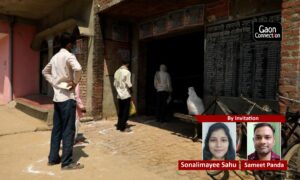The COVID-19 pandemic in India has imposed several challenges to the existing disaster-governance structure and its mechanisms in the country. It started with the sudden announcement of the lockdown last year by the Union government.
This was followed by the steps taken by the respective state governments, which only exposed the inadequacies of a proper decentralised disaster governance mechanism to combat COVID-19 in the states. The decision making was brutally centralised and citizens had to suffer.
In general, whenever a disaster occurs it is the communities at the grassroots who respond first.
When we look at the spheres of governance, it is the elected local government institutions like village panchayats, municipalities, municipal corporations, town panchayats, which are closer to the communities and can therefore better address and respond to any disaster.
Village panchayats in Tamil Nadu
The then All India Anna Dravida Munnetra Kazhagam (AIADMK) government hadn’t conducted urban local body elections in Tamil Nadu when the COVID19 pandemic started last year. And, it had not delegated adequate powers to rural local bodies in the 38 districts of the state.
Coming to village panchayats, the panchayat elections happened only in 29 districts of Tamil Nadu and the remaining nine districts were left without elected representatives.
Elected vs non-elected panchayats: A study
The Institute of Grassroots Governance (IGG), based in Tiruppur, decided to undertake a research study titled ‘Combating Covid-19 by Panchayati Raj Institutions – A Comparative study of Elected Vs Non-Elected Village Panchayats in selected Districts of Tamil Nadu’, which was funded by Azim Premji University as part of its COVID-19 Research Funding Programme.
The research team chose two culturally similar pairs of adjoining districts — Cuddalore and Viluppuram, and Tirunelveli and Thoothukudi — for this research study. Cuddalore and Thoothukudi have elected panchayat presidents while Viluppuram and Tirunelveli do not.
The field research was conducted in 100 village panchayats across the four selected districts in Tamil Nadu between October 2020 and December 2020.
Field interviews and focus group discussions were held amongst various stakeholders including panchayat presidents, panchayat secretaries, block development officers (BDO), anganwadi workers, village health nurse and the daily wage workers under the Mahatma Gandhi National Rural Employment Guarantee Scheme (MGNREGS).
Some of the research questions included in the study were — what COVID-19 protective and awareness measures were undertaken by village panchayats; how were the day to day activities implemented by panchayat administration; how were the grievances addressed by village panchayats; how were MGNREGS works executed in village panchayats; what were the financial sources available to village panchayats.
Also Read: The challenges COVID-19 presents in the villages of India, and what requires to be done
The findings of this research study are essential to understanding the importance of elected panchayat representatives at the grassroots, and the dynamics of decentralised governance during any disaster.
Research findings
The research findings showed that the village panchayats from Cuddalore and Thoothukudi districts, which have elected representatives, performed reasonably better in tackling COVID-19 related problems when compared to village panchayats from Tirunelveli and Villupuram districts that do not have elected representatives.
Awareness activities like distribution of pamphlets, conducting medical camps, mic announcements, were actively undertaken by panchayat presidents with active support from the community. Most of these elected representatives were first-time-elected and despite challenges, like lack of training and lack of funds from the Union and state finance commission, they were able to perform well using their existing leadership capabilities.
Village panchayats with elected representatives carried out more awareness drives and undertook various protective measures through disaster management committees. In contrast, there were no such committees formed in Tirunelveli and Villupuram districts where awareness activities were low.
The research also revealed that panchayat presidents were in a better position to address the day to day problems/grievances. The panchayats without elected representatives failed to address the grievances quickly during the pandemic.
Field observations in village panchayats without elected representatives also revealed that sanitation was poor in such panchayats.
Also Read: ‘1,621 teachers died of COVID19 following UP panchayat elections’ poll duty’
Decentralised governance and MGNREGS workers
However, all village panchayats struggled for funds in the pandemic. Due to delays in releasing rural local body grants, panchayats were forced to get funds from external agencies. In some cases, panchayat presidents themselves spent their own money to tackle COVID-19.
The focus group discussions with MGNREGS workers revealed that village panchayats with elected representatives cooperated and collaborated effectively with village health nurses, anganwadi workers, etc. This collaboration was largely missing or minimal in village panchayats without elected representatives.
Similarly, the processing of new job cards under MGNREGS was faster in village panchayats with elected representatives as compared to village panchayats without elected representatives. The delay in generating new job cards in the village panchayats without elected representatives was because of the increase in workload. BDOs were appointed to oversee and implement the developmental activities in more than 15 village panchayats, which prevented them from working efficiently.
Also Read: Coronavirus creeps up the Uttarakhand hills; villages in Chamoli and Rudraprayag sealed
Importance of decentralised governance
The survey found that decentralised governance brought about meaningful and effective community based measures to combat COVID-19 but it was not enough due to lack of devolution of powers from state government to village panchayats.
The second wave of the COVID-19 pandemic is spreading rapidly in rural Tamil Nadu and in the last few weeks, the positivity rate in many districts in the state have increased beyond 20 per cent, including in rural Krishnagiri, Virudhunagar, Cuddalore, Nagapattinam, etc.
In this scenario , the new Dravida Munnetra Kazhagam (DMK) government in Tamil Nadu should devolve more powers to elected village panchayat representatives to combat COVID-19 effectively.
Also Read: A tale of two Anaikattis
There are various decentralised governance strategies adopted by states like the panchayat war room in Kerala, panchayat level task force in Karnataka, empowering of sarpanch in enforcing lockdown in Odisha, which increase community involvement to combat COVID-19. These kinds of measures need to be taken in Tamil Nadu as well.
The chief ministers of Kerala, Odisha and Karnataka interacted with their panchayat representatives and issued necessary instructions to tackle COVID-19 in rural areas. Chief minister of Tamil Nadu, M.K Stalin has not yet interacted with the 9,622 village panchayat presidents of the state. Interaction with these elected representatives will boost their morale and encourage them to undertake innovative measures to contain the spread of virus.
Also Read: A tweet opens a Pandora’s box of how rural India is coping with the COVID19 second wave
The state government should develop standard operating procedures (SOPs) and ensure timely transfer of the rural local bodies grant of Rs 54,848 lakh (Rs 5484.8 million) directly to the panchayats which will help them to combat COVID-19 effectively.
M Gurusaravanan is the chairperson of the Institute of Grassroots Governance. Read the complete research report, here.


















